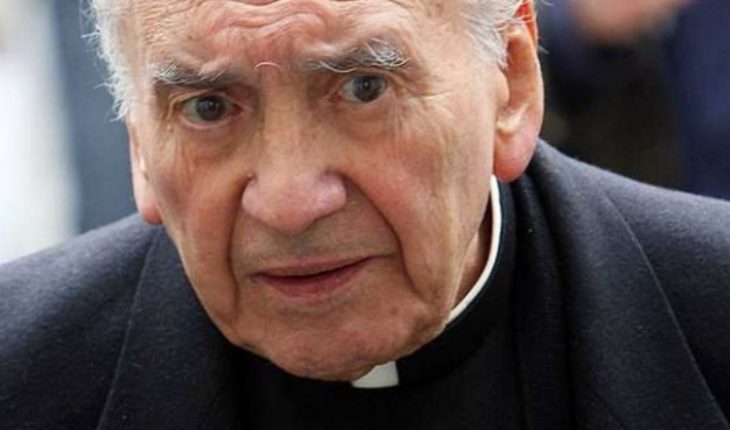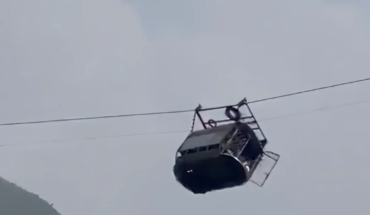“I’m flabbergasted. “I think that the other Jesuits are equal”, acknowledged yesterday in private a priest of the society of Jesus, who also emphasized that cannot say nothing publicly during the investigation initiated on January 12 against the deceased priest Renato canonical Poblete, influential former Chaplain of the household of Christ and flagship of the powerful religious congregation in Chile.
The complaint of abuse of Poblete was news of high impact. Among those who still try to assume it would be two lay very close to the deceased priest, as the current social director of the Hogar de Cristo, Pablo Egenau, whom the religious married, and Benito Baranda, who previously held the same post and was one of which appears loading the coffin of Poblete on the images of his funeral mass in 2010. It should not be forgotten that today questioned religious was Chaplain of the institution for 18 years.
The Hogar de Cristo delivered a statement on the same line as the society of Jesus, of “solidarity” with the victim and emphasizing its availability to cooperate with the investigation.
The beam in the eye the astonishment of the Jesuit world includes a disciplined silence, one bordering the double standard, in the light of the force which in the past eventually to other congregations and religious figures involved in cases of sexual abuse with minors of age or women, or those who concealed them.
“I do not dare to speak up not knowing more,” admitted another priest. The clerics asked to kindly refer to official information that can deliver the press section of the society of Jesus, directed by journalist Haydee Rojas, former head of communications of the Presidency during the Government of Michelle Bachelet and who previously he was in charge the communications equipment of the Archbishopric, in addition to working closely with the home of Christ, especially in the age in which commanded it Poblete.
Rojas confirmed that there will be no statements while the investigation develops and that the only official information so far is contained in releases on the subject broadcast on 17 and 27 January.
The communication strategy has been very secretive. The public statements of members of the order on the case were all well manicured, aligned to focus on supporting the complainant, Marcela Aranda, but have dodged speak in depth of Poblete, the internal impact that has meant for the Congregation facing one of its greatest figures involved in a case of abuse and, above all, the cover-up that there must have been the late religious behavior for years.
One of the first statements was the interview in La Tercera of the provincial in Chile of the Congregation, Cristian de el Campo, in which only provided data that met the facts on January 8, four days after ordering the investigation and only He personally met Aranda on January 17, when he met with her.
Yesterday the priest based in Tirúa, Carlos Bresciani, who said referred to the subject that the Jesuits “don’t escape the culture of concealment” and, rather than addressing the figure of Poblete, highlighted the courage of the victim. At the same time, the Revista Mensaje, Tony Mifsud, director spoke of ‘dignity’ of Aranda, who in his testimony there is “a trace of pain” and “is tremendously shocking: on the one hand it is a man who has done so much good, and that is, if there is the other” , one says ‘shoots, there is a certain fold’ “.”
Another Jesuit priest who knew Aranda in the Catholic University said that she “is a pretty good soul person” very respected and beloved among his colleagues of the Faculty of Theology and by that to his testimony hit so hard to those who were near Poblete. Obviously, all that is said in private.
The Jesuits in this issue strictly controlled communication strategy contrasts with its active presence media on other issues such as poverty, inequality and social exclusion, but especially with the vehemence and speed showed to refer to other cases of abuse, as the priest Fernando Karadima. At that time, one of the first to refer to the topic was the Jesuit priest Antonio Delfau, in 2010, who criticized the delay in having researched the facts that had been reported four years earlier and said that it was time to listen to the victims. Then, in 2011, he said without euphemisms that Karadima was “a tonton priest” and was one of the managers ensure that this alleged closeness with Alberto Hurtado was a fantasy of the former parish priest of El Bosque.
Interestingly one of the first priests who knew what was happening with Renato Poblete, according to the testimony of Aranda, Rodrigo Polanco Fernandois, Member of the priestly Union Pia, the dissolved group created by Karadima.
In the case of Felipe Berríos – one of the most sought by the media priests to discuss the crisis in the Catholic Church and that lives in a camp in Antofagasta, up to now has said that he knew nothing about the conduct of Poblete.
The prudence of Berrios now contrasts with the vehemence that had to ask the Pope, last summer, a gesture so that meet with victims of the former parish priest of El Bosque and their indignation in the presence of the Bishop Juan Barros, accused of cover-up of abuses , during the activities of Jorge Bergoglio in his tour of Chile. In 2018 may go in “secrecy and verticalism” Church that has allowed the abuses, as well as the deteriorating image of the Cardinals Francisco Javier Errázuriz and Ricardo Ezzati to be shepherds: “obviously they must leave, but independent of that there is a” social judgment on them”.
One of the latest and more on criticisms, the cardinal Ezzati, custom was the Jesuit and lawyer Marcelo Gidi, in October of last year. He said that the cardinal has to clarify its involvement in everything what is charged, because, while it does not, its expressions of forgiveness do not have arrival, are not welcomed by anyone. “Silence is their right, and I respect their right, but what’s good today is to go beyond the law and say: ‘ Let’s see, what do they need people who have been damaged by me?, what I speak or not speak?’.” That you speak! And take action,”said then.
Yesterday, when analyzing the Poblete canonical situation, was less categorical and said that “the only thing that can do justice in these cases is to investigate” and “to be repaired the damage caused by the facts established as true”.
The truth is that the society of Jesus has been characterized by a marked silence on abuse cases where defendants have been members. For example, complaints against the priest Jaime Guzmán Astaburuaga met in 2010 and just a year ago were made public, as he clarified upon request of one of the victims. Regarding Eugenio Valenzuela, former provincial in Chile, the complaint made in 2011 and after an initial discredit upon this, it was decided to take out it of the charge in 2013.
In the case of Renato Poblete, one of the words most around these days is “cover-up” and from the environment of the Congregation they ensured that that edge is “very strong”. Not for nothing the Attorney Juan Pablo Hermosilla–representing Aranda – said that there are living people who knew of the accusations against the former icon of the society of Jesus.
Hermosilla noted in cooperative research “is not against Renato Poblete, that will focus on the structure that had the company of Jesus and its responsibility by not protecting the victims of abuse, even knowing the situation” said, considering that the Congregation already acknowledged having received other three complaints against Poblete.





